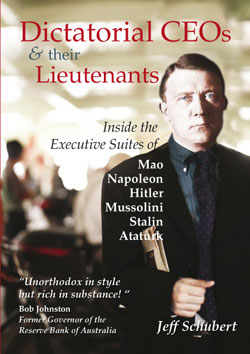Dictatorial CEOs & their Lieutenants – Inside the Executive Suites of Napoleon, Stalin, Ataturk, Mussolini, Hitler and Mao
FOREWORD by: Bob Johnston, former Governor (Chairman and CEO) of the Reserve Bank of Australia.

‘Unorthodox in style but rich in substance! This book has so much to offer both the history buff and the psychologist; and act as a cautionary tale to the aspirant to power.
Manfred Kets de Vries, Director, Global Leadership Center, INSEAD, France.
‘Jeff Schubert’s book is a veritable Who’s Who of the dictators who have put their stamp on the world in the past two centuries. Taking these dictatorial leaders as examples, the author helps us to become more alert to the darker side of humankind’.
Ross Garnaut, Professor of Economics, Australian National University (ANU), former Australian Ambassador to China.
‘Jeff Schubert is well known for lateral thinking about big issues affecting the world. This book provides exciting insights into some of the most important, enthralling and appalling figures that have shaped the world’.
Tudor Rickards, Professor of Creativity and Organisational Change, Manchester Business School, UK.
Tudor’s book review can be read on his web-site, Leaders We Deserve (under Links in left side-bar). Commenting on Jeff’s psychological profile of Julia Gillard, Tudor wrote: As ever, Jeff supplies fascinating insights into leadership. He has also written about “The Schubert Proposition” in relation to Fidel Castro; described Jeff’s comments on Vladimir Putin as being “as cogent and insightful as ever”; and referred to Jeff’s “powerful critique of the tyrant” in relation to Robert Mugabe (see Links).
Prof. Alex Wearing, Psychology, University of Melbourne, Australia.
‘Almost compulsive reading.’
Barbara Kellerman, Harvard Kennedy School.
‘An interesting contribution to the leadership literature.’
Prof. Ken Parry, Graduate School of Management, Griffith University, Australia
‘The dictatorial CEO meets the organizational psychopath. We all know these people. Refreshingly, the message form this book is how to live with one, rather than how to become one. An important contribution to the literature and a useful read for any manager’.
Prof. Richard Badham, Macquarie Graduate School of Management, Macquarie University, Australia
‘This book cuts across boundaries. Its research methods and style are far from orthodox. It does not fit into the nice disciplinary categories of contemporary management thought and social science research. This is why I would recommend it! Anyone with experience in organisational life is aware of the centrality of office politics. Politics at the top is unsurprisingly at the summit of this political pyramid. It is far too rarely discussed and reflected on with any range or depth. This book provides an engaging and interesting introduction to many of the issues. It is worth buying simply for the stories and quotes from well-known contentious historical figures.’
Rawdon Dalrymple, former Australian Ambassador to Indonesia, Japan, USA
‘Heaps of interesting material, and the author develops the picture of each one by building up the anecdotal and other quoted material.’
Warren Reed, former Australian Secret Intelligence Service officer, Co-author of “Plunging Point: Intelligence Failures, Cover-ups, and Consequences”
‘There’s a crying need for a book like this, at a time when the currency of truth is debased and we think we have nothing to learn from the past about the human condition’.
Dr David Jago, International Professional Training Ltd, Moscow
‘Jeff Schubert has produced a work that is of equal interest to business people and amateurs of history. By crisscrossing back and forth among the careers of six autocratic leaders, from Napoleon to Mao Zedong, he is able to trace the similarities among them, as well as implying parallels with (unnamed) no less autocratic CEOs. Very clear in its structure, the book defines the Man, i.e. the kind of personality that seeks such a dominant position, along with the lieutenants, the more pliable personalities that gather round the autocrat and support him in his role, thereby finding their own identity. Intelligent selection from a wide range of secondary material produces a continuous stream of illuminating quotations, bringing out the similarities among the autocrats, albeit from different countries and historical backgrounds. Like many works dealing with the minutiae of human nature, the picture drawn is distinctly unedifying. History, it has been said, is just one damn thing after another! But whereas the amateur historian can view the goings-on from a safe distance, for the business person it can be a question of (professional) life or death. The latter section of his readers will read this book with riveted attention, but finally lay it down feeling distinctly queasy!’


